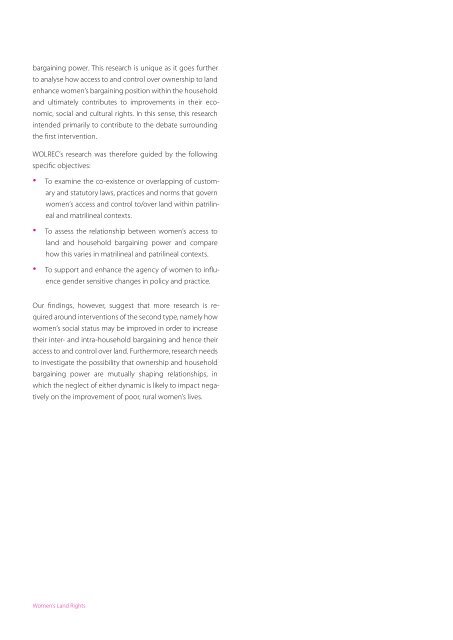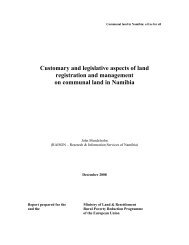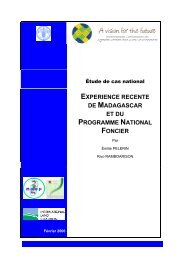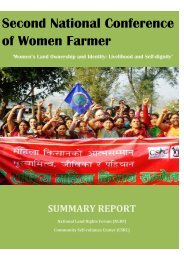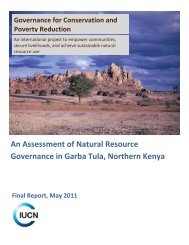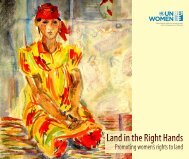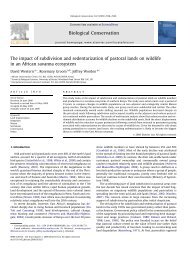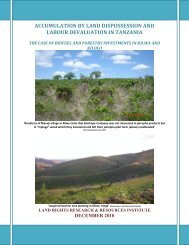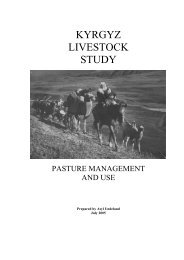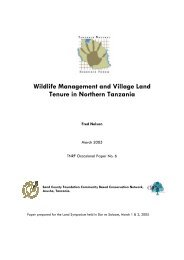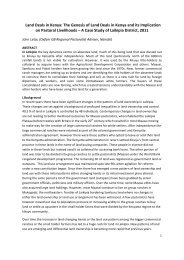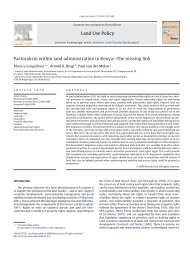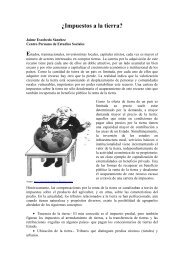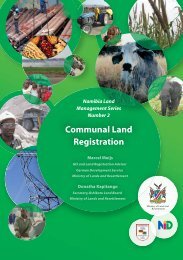Women's access to land and household bargaining power
Women's access to land and household bargaining power
Women's access to land and household bargaining power
You also want an ePaper? Increase the reach of your titles
YUMPU automatically turns print PDFs into web optimized ePapers that Google loves.
argaining <strong>power</strong>. This research is unique as it goes further<br />
<strong>to</strong> analyse how <strong>access</strong> <strong>to</strong> <strong>and</strong> control over ownership <strong>to</strong> <strong>l<strong>and</strong></strong><br />
enhance women’s <strong>bargaining</strong> position within the <strong>household</strong><br />
<strong>and</strong> ultimately contributes <strong>to</strong> improvements in their eco-<br />
nomic, social <strong>and</strong> cultural rights. In this sense, this research<br />
intended primarily <strong>to</strong> contribute <strong>to</strong> the debate surrounding<br />
the first intervention.<br />
WOLREC’s research was therefore guided by the following<br />
specific objectives:<br />
• To examine the co-existence or overlapping of cus<strong>to</strong>mary<br />
<strong>and</strong> statu<strong>to</strong>ry laws, practices <strong>and</strong> norms that govern<br />
women’s <strong>access</strong> <strong>and</strong> control <strong>to</strong>/over <strong>l<strong>and</strong></strong> within patrilin-<br />
eal <strong>and</strong> matrilineal contexts.<br />
• To assess the relationship between women’s <strong>access</strong> <strong>to</strong><br />
<strong>l<strong>and</strong></strong> <strong>and</strong> <strong>household</strong> <strong>bargaining</strong> <strong>power</strong> <strong>and</strong> compare<br />
how this varies in matrilineal <strong>and</strong> patrilineal contexts.<br />
• To support <strong>and</strong> enhance the agency of women <strong>to</strong> influence<br />
gender sensitive changes in policy <strong>and</strong> practice.<br />
Our findings, however, suggest that more research is re-<br />
quired around interventions of the second type, namely how<br />
women’s social status may be improved in order <strong>to</strong> increase<br />
their inter- <strong>and</strong> intra-<strong>household</strong> <strong>bargaining</strong> <strong>and</strong> hence their<br />
<strong>access</strong> <strong>to</strong> <strong>and</strong> control over <strong>l<strong>and</strong></strong>. Furthermore, research needs<br />
<strong>to</strong> investigate the possibility that ownership <strong>and</strong> <strong>household</strong><br />
<strong>bargaining</strong> <strong>power</strong> are mutually shaping relationships, in<br />
which the neglect of either dynamic is likely <strong>to</strong> impact nega-<br />
tively on the improvement of poor, rural women’s lives.<br />
Women’s L<strong>and</strong> Rights


